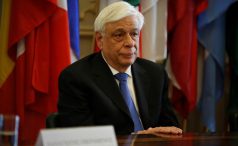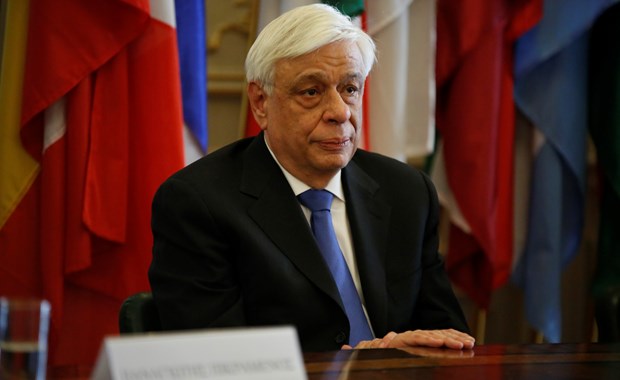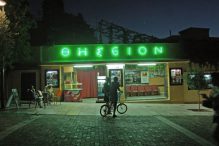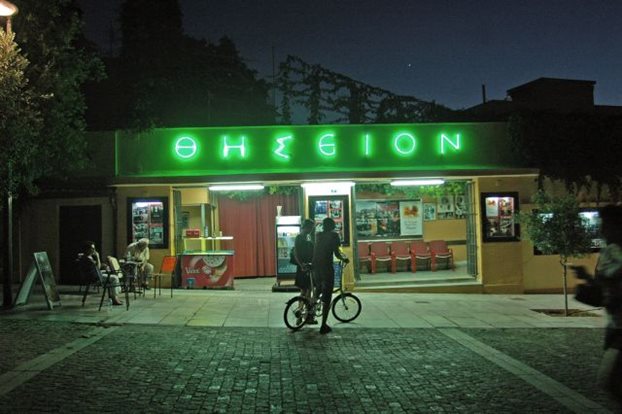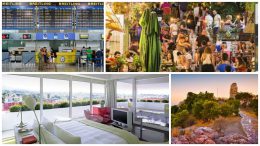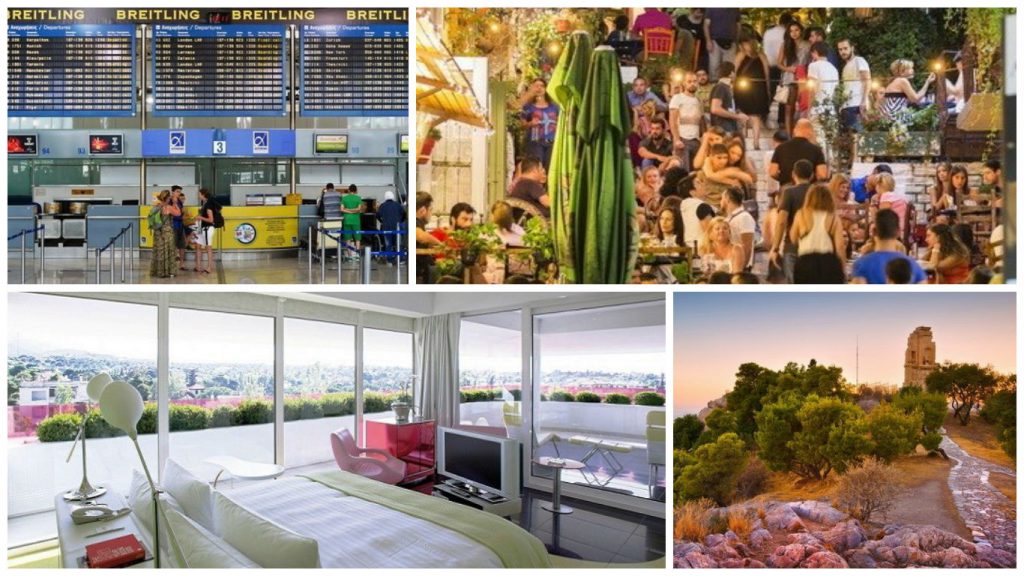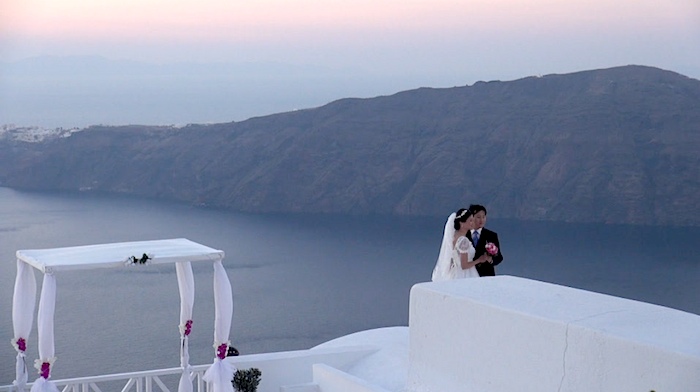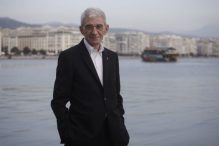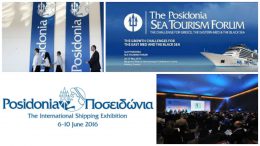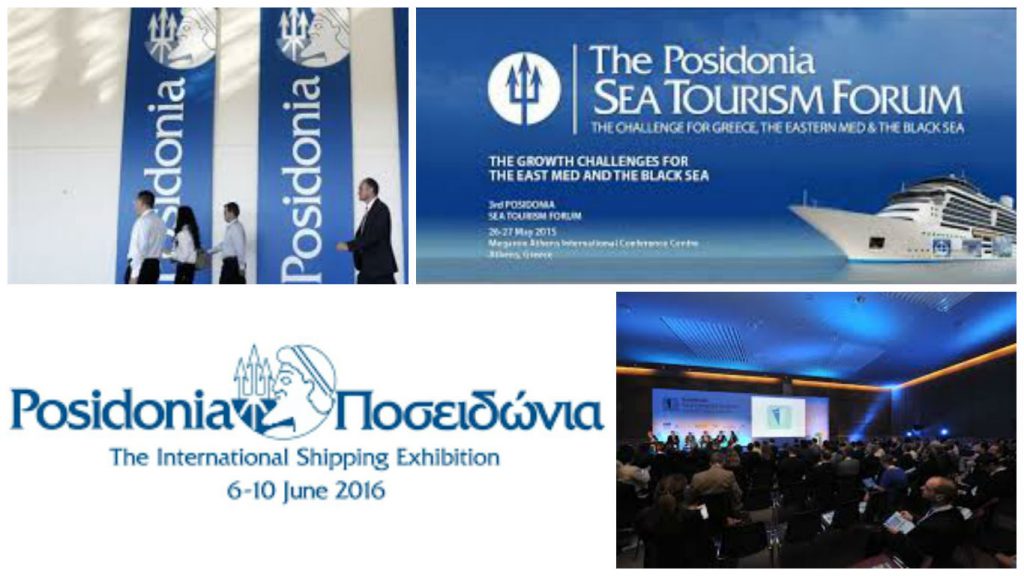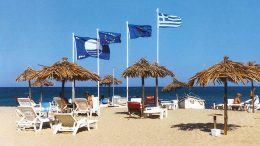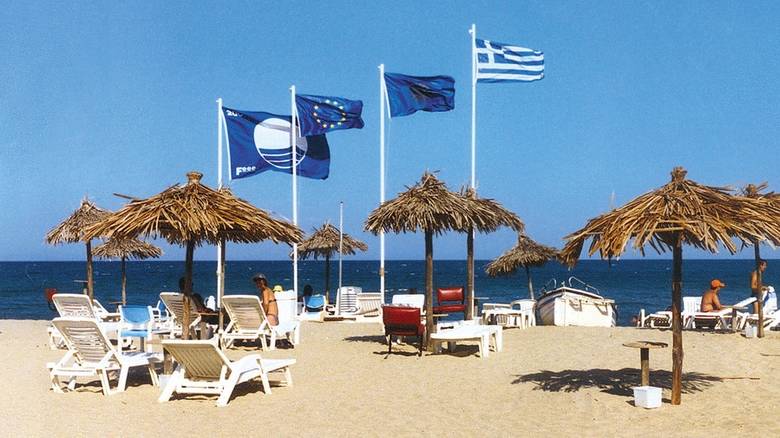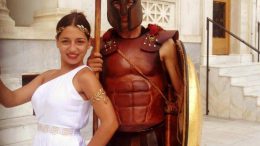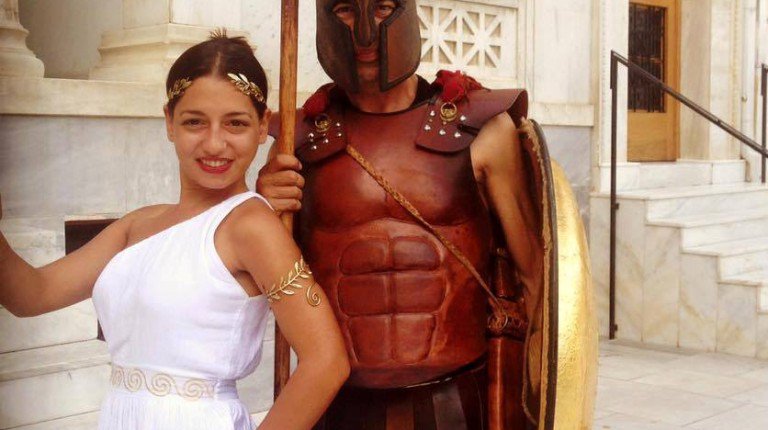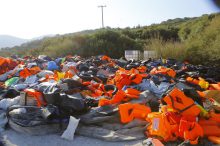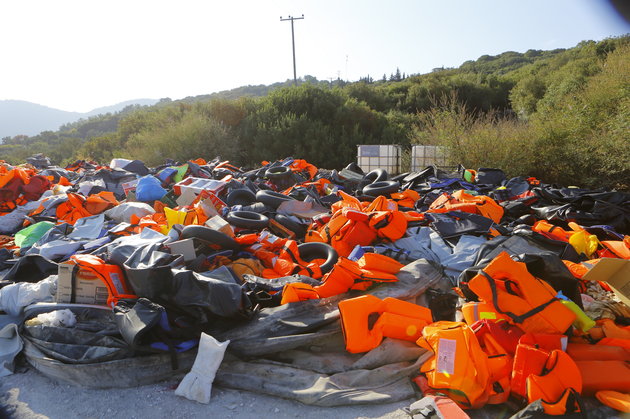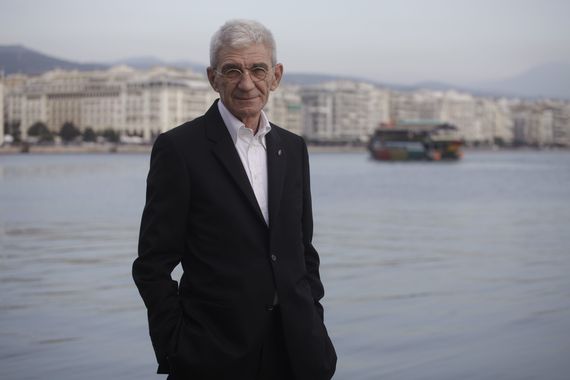 Interview to Justine Frangouli-Argyris
Interview to Justine Frangouli-Argyris
Yiannis Boutaris is the Mayor of Thessaloniki, the Mayor with the youthful look who sports an earring. He is the politician who dares go against the traditional grain and who continues to leave a positive footprint on his metropolis.
A successful businessman, he has given new impetus to the city of Thessaloniki, especially by turning around its finances, albeit the deep economic crisis facing Greece. Now, he is being honored, in New York, with the “Damaskinos Award,” which he is accepting, on behalf of the City of Thessaloniki, for its protection of the Jews during the Second World War.
Could you tell us a few words about the award you are going to receive in NY?
The “Damaskinos Award” which I’m going to accept from his Eminence Archbishop Demetrios, Geron of America, Primate of the Greek Orthodox Church in America during a great ceremony at the Hebrew Union College, is a great honor for me, for the Municipality and the city of Thessaloniki. It’s an award that goes to individuals who have promoted and defended tolerance and cooperation among all religions in Greece. I can only express my gratitude to the American Friends of the Jewish Museum in Greece for giving this great award to me and, hence, to Thessaloniki. This is indeed a great symbolic reward for our efforts, as a local authority, to open up the city, to establish tolerance and inclusiveness; and of course a reward for our efforts to highlight the Jewish heritage of Thessaloniki, that used to have the largest and most vivid Jewish community of Greece and Europe, and which was lost almost in its entirety in the Holocaust – a history so recent but also so muted until a few years ago when we started breaking this strange silence.
This trip to the US, though, is full of commemorations for the city of Thessaloniki. Beside NY, in Washington DC I will participate in the AJC Global Forum and I will sign symbolically the Declaration of the Mayors United Against Anti-Semitism before an audience of 2.500 people, representing the European efforts to combat anti-Semitism. I am obliged to the AJC for choosing me among hundreds of European Mayors in order to support this Campaign and combat the scourge of anti-Semitism. I hope I can deliver as much to this cause as expected.
Given the harsh economic reality, how is it that you were able to turn around the city of Thessaloniki’s finances in such a short period of time?
When we took office in 2011, the Municipality of Thessaloniki was shaken by a great economic scandal -inherited by the previous administration- of around 50 million Euros missing from the municipal treasury; this was followed by long judicial procedures implicating the previous Mayor. As a result, my predecessor and his closest colleague are still in jail. Bit, it was also the beginning of the severe economic crisis and the municipalities in Greece had undergone cuts of 40% that year and within three years this percentage skyrocketed to 60%-70% cut-down of state funding.
So, we put forward our basic principle of sound and transparent economics, cutting down on unnecessary spending by 30%, fictitious overtime payments by one third, and diversifying the Municipalities income sources, by applying for externally funded projects, either European or other, of around 70 million Euros in three years. We managed, thus, to cut down on municipal taxes by around 20% in three years, to pay back almost fully money we owed to the local market and to achieve surpluses in our budget from the first year of our tenure.
You have been called a “vision of hope” for Greece and are constantly shortlisted for “World Mayor of the Year.” What makes Yianni Boutari so successful?
Well, not “constantly” shortlisted for “World Mayor of the Year”; I was nominated as Mayor of the month back in October 2012. I was also shortlisted for Mayor of the Year 2014 and I got voted 8th in the world, but thank you, anyway! It’s a bit awkward to talk about “what makes me so successful”. I guess it has to do with the fact that I’m not a typical politician; I come from the business world and the civil society, and I always try to solve problems in a practical way. It might also have to do with the effort I took up since 2011 to make Thessaloniki known as a touristic destination based on its multi-cultural history of 2.300 years, along with its Ottoman and Jewish past, talking in fact about openness, extroversion, inclusion and tolerance. But, mind this; all these distinctions are Thessaloniki’s distinction.
You have referred to the migrant crisis as a European problem, not a Greek one. Is there a solution?
The migrant crisis is a serious problem indeed for the whole of Europe. Europe has to find its new balance, its new narrative on how to receive and integrate those new citizens, who are obviously going to stay for long in Europe. Unfortunately, Europe is not strong enough nowadays; it has problems in identifying a new economic model that will secure sustainable development for all its members; it has problems in securing an integrated political approach, it has never even touched upon the issue of strengthening democratic processes in the Union; and right now the far-right is rising in many European countries. So, things are not easy for Europe, because immigrants and refugees will keep coming, since the war in Syria does not seem to be ending soon – which is another issue that the EU has not touched upon.
In my opinion, the only solution to the problem is for Europe to start now, be it late but not too late, to built a mechanism of receiving and integrating these people. Otherwise, we will all end up with new kind of ghettos or favelas, full of marginalised and impoverished people who will soon start hating their new homes; this is a good recipe for fuelling fanaticism of any kind, this time within our own borders, within our own societies. We have to deal with it on a European level and we have to do it fast.
What is the current situation in Idomeni?
The last week of May, Idomeni was evacuated by police forces during an organised operation that lasted a few days. People left the spot for other organised refugee camps in the rest of Greece without trouble. Most of the Idomeni refugees were led to Northern Greece and at the wider area of Thessaloniki. I have the feeling they will stay long. The Greek state must take action to accommodate and integrate them properly in local societies and in the economy.
We try to play our part in all this; we just concluded an agreement with the UNHCR along with other municipalities and partners from the civil society in the Thessaloniki wider area to run a program funded by the European Commission for accommodating temporarily asylum seekers and relocation seekers in rent apartments and foster families. And we already run another program funded by the Open Society Foundation for accommodating in hotel rooms the most vulnerable ones of the refugees.
Europe has to play its own part; it has to put forward the relocation system agreed upon some time ago, which doesn’t seem to be really working right now; we should at least to a certain degree respect the will of the refugees themselves, the majority of which desperately look for a better future in Northern Europe.
Despite all the hardships facing your country, tourism has remained surprisingly resilient, breaking record upon record. How do you see this year’s numbers stacking up?
Well, it seems indeed that tourism in Greece was not hit by the refugee crisis, despite the xenophobic voices that kept scaremongering in the outbreak of this crisis. On the contrary, tourism professionals estimated that 2016 would be a record year for tourism in Greece. I guess we’ll see how things go. But I must say that tourism has to do with politics nowadays. Terrorist attacks, political instability and geopolitics have impact on tourist flows. Greece is a safe country; politics are just fine this period, everyday life is quiet and normal, despite the hardship that many families go through because of the economic crisis. Visitors have nothing to fear and they have a lot to enjoy in Greece; they should come and see. And of course we are expecting them to visit our city, Thessaloniki.
What does Thessaloniki have to offer the visitor?
Thessaloniki is a modern Greek city, a very easy-going city.
Apart from its 2.300 years of uninterrupted presence, that have left their signs in the cityscape but also in everyday life – one can see the Hellenistic, Roman, Byzantine and Ottoman monuments and sights, among them 15 UNESCO International Heritage monuments, and can find the traces of the Jewish heritage of the city – composing its multi-cultural and cosmopolitan history, Thessaloniki is also a youthful and creative city, thanks to its four state universities and many private colleges where more than 120.000 young people study. It’s a cultural hub, too, with many international events, such as the International Film and Documentary Festivals and the Biennale of Modern Art, but also featuring many local cultural and creative groups composing a lively, dynamic and extrovert community, very fond of synergies.
Along with culture, innovation and entrepreneurship try to spring up, since many young people go after social, cultural, innovative and start-up entrepreneurship, I guess as an outcome of the economic crisis that has changed the white collar-public servant mentality of the past.
Of course, visitors should not miss the gastronomic treasures of Thessaloniki, a gastronomic destination filled with restaurants, taverns, bars and cafes, where one can taste great local cuisine – an amalgam of Ottoman, Mediterranean, European and Balkan elements – highlighted lately also by the New York Times, that included our city in the 52 destinations one has to visit in 2016 thanks to its reach gastronomic culture.
Thessaloniki is a port city, and the waterfront – recently redeveloped and many times awarded in international architectural competitions – is a must-visit site from which one can admire mount Olympus and gaze its gods. Last, but of course not least, starting out from Thessaloniki one can visit many landmarks of Greece, like mount Olympus, the Holy Monastic Community of Athos, Halkidiki’s wonderful beaches, Vergina the land of Alexander the Great, and even travel daily to neighbouring Balkan countries.
Well, one needs to come and see. People enjoy their stay in Thessaloniki, because it’s friendly, welcoming and of course interesting. We invite Americans to visit Thessaloniki, I’m sure they will enjoy it.
How do you perceive the efforts of the Tsipras government?
The Tsipras Government is one of good intentions, poor preparation and no experience – but they learn fast and, hopefully, in the future they will become much better. Of course, Greece’s problem is a multifaceted one; in order to solve it, the Government has to – and it seems it already does – move towards more pragmatic solutions. The EU, on the other hand, has to remember its roots and honour its values; it has to become a Union again, not just a gathering of finance and economics ministers taking decisions about financial and economic issues. Finally, international politics have to sideline hawkish views like the ones the IMF seems to fancy.
What would you have done differently given the Prime Minister’s chair?
You know, there are very narrow margins within which the Greek prime minister can manoeuvre right now in Greece due to the fierce crisis. But I would certainly not try to hide things from people. I would be sincere and realistic.
But I have to say, I’m not interested in central politics; I am a local politics guy, working for local authorities. My ambition is to make them more independent, strong and able to serve as proper local governments. I believe this is what I have to offer, be a good mayor.
The Hellenic wine industry has made tremendous progress with many wineries, including Kir-Yianni, regularly producing world class products. What has enabled this segment of the economy to become so prolific?
The progress of the wine industry during recent years is truly impressive. Is it yet another Greek paradox, following the French paradox? There is an explanation on how an industry in today’s Greece manages to increase its exports and win over the new and old foreign markets in a fast growing pace.
A few years back, our common efforts led us to the idea of creating a National Strategic Marketing Plan for Greek Wine (launched as New Wines of Greece), in Greece and abroad. It is a large and ambitious project which was realised through collaboration, common perception, and a large amount of money that we agreed to spend together for this goal. Today, 6-7 years later, we’re still working all together true to our principles and goals, and even though the social, economic, and business environment is entirely different to when we first started, we are happy to witness positive results in the foreign markets. We are especially happy for this, as Greek wine finds its rightful place in the global markets, thanks to its typicity, its unique qualitative and organoleptic characteristics and the potentiality of the indigenous grape varieties.
What do you hope to accomplish before the end of your current term?
Many things are going on, and many things have to be pushed forward. One of the important projects we are going after during this term is the effort to attract funds from external sources in order to push through our strategic plan for a viable, sustainable, innovative and resilient city that can stand up to the demands of cities’ international competition and, mostly, that can lead the local community safely out of the economic crisis.
Of course it’s of the highest priority to boost and complete the initial effort to open up the city and put it on the global map as a tourist destination. This is where the Holocaust Museum and Educational Centre comes in; it is a big and important project. We strongly believe that this Museum and Educational Centre will recall the tragic fate and perpetuate the memory of the Thessaloniki Jews deported to concentration camps during WWII, but also that it will serve as a platform against racism, xenophobia and all forms of totalitarianism. In a few words, our goal is to continue our efforts to restore the city’s prominent role in SE Europe. The only way to achieve that is to transform Thessaloniki to the big port of the Balkans and the Eastern Mediterranean. That’s how it used to be, that’s how it used to thrive for the longest part of its history.
What does the future hold for Yianni Boutari?
I strongly believe that Mayors should not have more than two terms, because power wears down its carriers but also corrupts them. In any case, there is still a lot of time until 2019 when this term ends. But for me life is sweet; you know, I’m in love with life, and I will never get bored or tired of living it. I still want to enjoy it at its best.
(www.huffingtonpost.com)
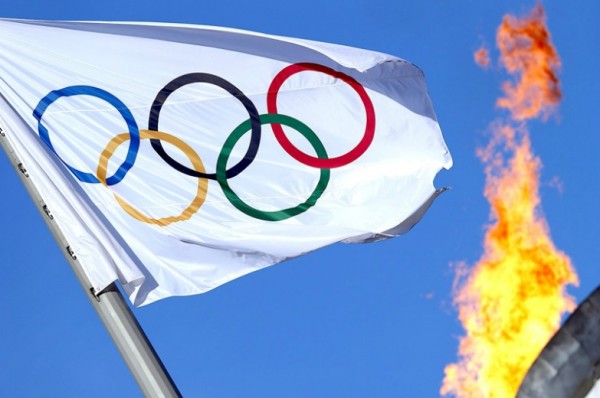 In a spirit of international cooperation and common sense I think we should promote the idea of just giving the Summer Olympics to Greece. Permanently. By all accounts they made a reasonable fist of it when they last had them and could do so time and time again. It has a nice historical touch … returning them to their birthplace.
In a spirit of international cooperation and common sense I think we should promote the idea of just giving the Summer Olympics to Greece. Permanently. By all accounts they made a reasonable fist of it when they last had them and could do so time and time again. It has a nice historical touch … returning them to their birthplace.
